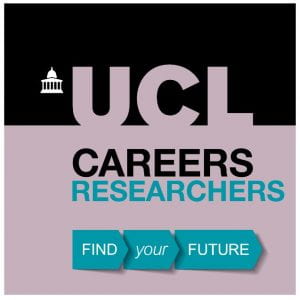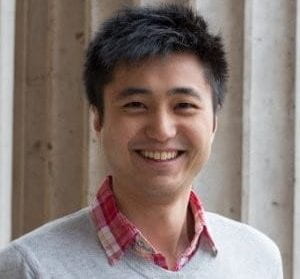Researchers Careers in Communication guest feature!
By uczjipo, on 28 February 2020
Researchers Guest Feature:
Taking a closer look at our monthly employer-led events topics
During our themed months, we will be taking a deeper look into each key topic. In these posts, we will be investigating what a career in this industry looks like for a researcher. Each month there will be insights from an expert who has been through the process of transitioning out of academia. Each contributor will give us their key tips for following a non-academic career path whilst letting us in on the things they wished they had known before taking the leap. Find out about the roles their organisation has to offer and get some key tips on applying.
This month it’s all about Communications…
Taking a deeper dive into the communications industry from the perspective of producer specifically looking at what this is like for a researcher, we have our contributor – Nikolay Nikolov.
Contributor Nikolay Nikolov, Senior Producer, Mashable, PhD in Anthropology UCL
Describe your role and the organisation you work with..
I manage a team of two video producers who are tasked with news-gathering, interviewing, shooting, and producing short-form videos that cover the intersection between technology and sustainability. My role is to drive the Mashable video voice forward, creating thought-provoking documentaries and series that introduce our work to new audiences and challenge norms.
Mashable is a digital media company that focuses on our shared life in the digital age and all that that entails. Each editorial vertical – video is one – has a focus that ranges from entertainment through culture to social good and science. The role of video, specifically, is to experiment with ways to tell powerful stories in different mediums – one video can be posted on Snapchat, for example, another on TikTok. The key is to find how the narrative and story corresponds with the platform and anticipated audience.
Give a brief overview of your industry and the opportunities that are available to researchers…
Journalism – and digital journalism – is a very difficult field to break into and one that often falls victim to preferential treatment, influence, and connections. Oftentimes in my career I have been encouraged to omit my academic background because it might make me seem overqualified and unemployable. That said, there are a number of incredibly successful journalists who have a strong academic background – Anne Applebaum is the first to mind. Having a PhD, at the very least, can help one build a strong career as a reporter, analyst, or opinion writer. But those type of positions tend to occur later in one’s life and are, as you may assume, highly competitive.
In terms of job titles and options for researchers, it is difficult to say without specific discussions of expertise. The world we live in is increasingly marked by disinformation and digital propaganda and I can see how certain areas, specifically in journalism, benefit immensely from people who have an academic background – climate change is one; technology is another, specifically when it comes to Open-source intelligence (say, Bellingcat or the Atlantic Council’s Digital Forensic Research Lab). The New York Times and BBC Africa have both now created digital forensic teams that have made groundbreaking investigative work that is based on tools and knowledge that derives from a variety of academic fields.
Describe your academic background
My research was about finding a way to track how much daily life changes before and after huge societal transformations – like the socialist regimes in Europe. The way I approached it is by looking at the mass housing complexes, called ‘panelki’, which can still be found to house large portions of populations of the former socialist bloc. Because these complexes were prefabricated and largely resembled one another (in Bulgaria, for example, around two million people live in largely identical flats), my research traced how people made changes to their homes over the years – changes to the functionality, to the external facades, to the interior designs; but also social changes – who lived there, how, for how long, where are they now, etc.
What were the key skills you used during this time…
One of the key skills I learned is conducting interviews, taping conversations and taking photographs. When it comes to ethnography, especially in the urban setting, it’s a valuable skill for a journalist. Knowing how to adapt to different individuals, how to enter unknown settings (someone’s home, say), how to ask and repeat intimate or private questions and then how to transcribe and use those quotes is essentially what a lot of the hard work in reporting is all about. Particularly when it comes to features and long-form articles, that is essential.
My role is to tell powerful stories that educate people about a changing world. My academic work largely looked at how those changes occurred, so it hasn’t been useful in a direct way. But academia helps in other ways – having access to and being open to reading research papers that sometimes include incredible innovations and becoming the first to break the story that way. It helps in terms of the in-built sense of critique, where the search for plausibility and certainty is an innate goal in itself.
What did you find challenging about transitioning out of academia and how did you overcome this?
I started working as a journalism within three months of starting my PhD. I learned that, in my field specifically, an academic career was hard fought and required a lot of sacrifices in terms of financial independence and settling down. I also found academia stale – in the sense that many people, both academics and students, would end up fixed upon one subject area for extended periods of time. For me, that was simply not interesting or appealing – I wanted to have the flexibility and freedom to have more direct choices about what I could do, where I could live, and how I could earn a wage.
Conversely, what I found challenging when I started working in journalism is having no freedom over my own time and struggling to find meaning in what I did. At UCL, I got to teach first year students Philosophy, to travel across Europe and write about a subject I was deeply curious about. It’s a privilege that I took for granted because, particularly in journalism, you are accountable to both readers and editors and it is a difficult balance at times.
What do you wish you had been told when looking to transition out of academia?
I wish I was told to branch out, stay curious, meet new people. Academia can be clique-y and isolating, especially if you’re trying to change sectors all together. Staying curious means being
versatile and being able to adapt to the world as it is, not as you were taught to see it. A lot of people I know, who are around my age, have ended careers and started anew because they succumbed to the churn of a 9-to-5. Anticipating that is crucial for anyone moving on from academia. That said, some of the most considerate and nuanced people I’ve ever met were people I met during my PhD. Perhaps, at times, an undercurrent of self-confidence affected us all when it came to imagining our prospects outside of a strict academic career. I can safely say that any such worries are misplaced and, in fact, the world requires more people with expert knowledge working in places like journalism.
What is your top tip for researchers when applying to roles with your organisation..
Have a website that showcases, in a sense, your portfolio. In my case that’s www.nikolaynikolov.co – it shows all the video and radio work I’ve done. Maintaining active social media channels (Twitter, LinkedIn) are key for journalism. Cover letters are key because they can provide context for someone’s interest in an entry level (say producer job) that is not reflected in their resume. My first job in journalism, at AJ+, taught me everything I know about editing video. They didn’t hire me because I was doing a PhD, they hired me because I expressed a keen interest in the areas they were covering and was ready to learn new skills.
A big thank you to Nikolay for sharing your wisdom on those key transferable skills from academia to industry and giving us a great insight into your industry. Want to hear more? Come along to our events and hear from PhD level speakers across a range of industries all with valuable insights into what life is like after academia.
 Close
Close











